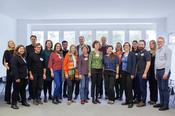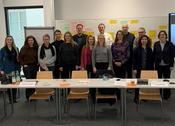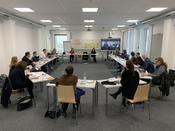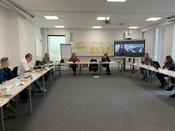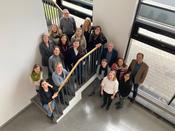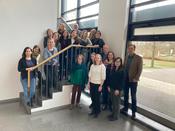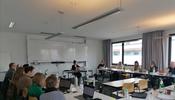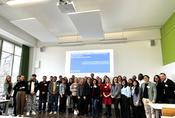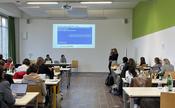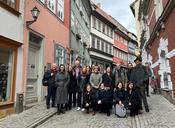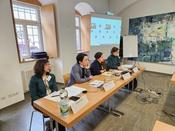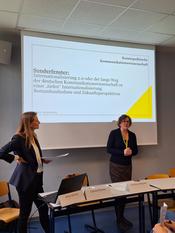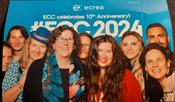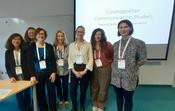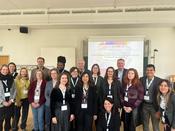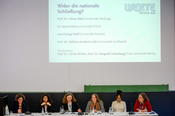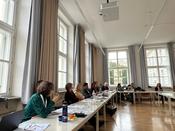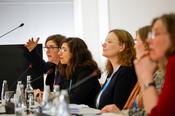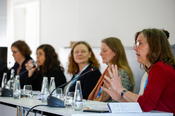Department of Political and Social Sciences
Service Navigation
Cosmopolitan Communication Studies
Renowned and young scholars in German communication studies are campaigning for more cosmopolitan communication studies and its "deep internationalisation".
In a network funded by the DFG, these ideas are being advanced through a mapping of the research and teaching landscape in communication studies in Germany, several workshops, and a handbook. The network has a funding period from July 2021 to March 2025.
If you are interested in joining the network, please do not hesitate to contact us.
About the Network
- Hanan Badr (University of Salzburg)
- Markus Behmer (Otto-Friedrich-University Bamberg)
- Susanne Fengler (Technical University Dortmund)
- Anke Fiedler (University of Greifswald)
- Anne Grüne (University of Erfurt)
- Kai Hafez (University of Erfurt)
- Oliver Hahn (University of Passau)
- Kefa Hamidi (Leipzig University)
- Thomas Hanitzsch (Ludwig Maximilian University of Munich)
- Christine Horz-Ishak (Cologne University of Applied Sciences)
- Beate Illg (Jade University of Applied Sciences)
- Anna Litvinenko (Freie Universität Berlin)
- Martin Löffelholz (Ilmenau University of Technology)
- Melanie Radue (University of Erlangen-Nürnberg)
- Carola Richter (Freie Universität Berlin)
- Barbara Thomaß (Ruhr University Bochum, Leibniz Institute for Media Research | HBI)
- Awais Ahmad (University of Passau)
- Ömer Alkin (University of Erfurt)
- Stefanie Averbeck-Lietz (University of Greifswald)
- Daniel Bellingradt (Univeristy of Erlangen-Nürnberg)
- Lisa Bolz (University of Paris Sorbonne)
- Regina Cazzamatta (University of Erfurt)
- Otávio Daros (Pontifícia Universidade Católica do Rio Grande do Sul)
- Ines Drefs (Technical University Dortmund)
- Thomas Eckerl (University of Passau)
- Mandy Fox (University of Passau)
- Lukas Kick (University of Passau)
- David Castro Lotero (University of Passau)
- Judith Pies (Stuttgart Media University)
- Aynur Sarisakaloglu (Ilmenau University of Technology)
- Florian Stalph (Ludwig Maximilian University of Munich)
- Jeannine Teichert (Paderborn University)
The book "Cosmopolitan Communication Studies: Toward Deep Internationalization" is a key outcome of the network's work. Edited by Carola Richter, Melanie Radue, Christine Horz-Ishak, Anna Litvinenko, Hanan Badr, and Anke Fiedler, the volume contains 15 contributions that vividly illustrate the cosmopolitanization of communication studies. The volume proposes a “deep internationalization” of media and communication studies by offering insights and guidance on how to integrate a cosmopolitan perspective in a variety of subfields of our discipline. Building on debates on de-Westernization and cosmopolitanism, the contributors advocate for the inclusion of both global and local perspectives and context-led approaches. They argue that acknowledging and incorporating epistemologies, topics, and methodologies from diverse regions, contexts, and backgrounds will enhance the comprehensiveness and relevance of our discipline and foster a more inclusive and meaningful understanding in communication studies.
The book has been published by Transcript and can be downloaded free of charge as an Open Access edition here.
The network presented the book "Cosmopolitan Communication Studies. Toward Deep Internationalization" both at the ICA Annual Conference in Denver/USA, and at the IAMCR Annual Conference in Singapore, and discussed it with international colleagues. More information can be found here.
During the DGPuK Annual Conference in Berlin, a workshop organized by the network took place on March 19, 2025, to prepare a guide for communication science educators. This guide, presented in the form of a blog, aims to provide practical support for the internationalization and cosmopolitanization of courses and modules in communication studies.
Additionally, during the panel discussion titled "Against National Closure" on March 21, 2025, Hanan Badr, Stefanie Averbeck-Lietz, Anne Grüne, and Ana-Nzinga Weiß engaged in a conversation with Margreth Lünenborg and Carola Richter. They explored the potential of diversity and internationalization for German-speaking communication studies using best-practice examples.
Please find more information here.
During the Annual Conference of the International and Intercultural Communication Division of the German Communication Association (DGPuK) on “Overcoming the Divides? Towards Global Inclusivity in Communication Studies in Times of Uncertainty” at Salzburg University, our network hosted its second edition of a PhD workshop on 14 November 2024.
Please find more information here.
At the 10th ECREA annual conference “Communication and social (dis)order” in Ljubljana in September 2024, the network “Cosmopolitan Communication Studies” presented in its own panel important chapters of a book which will be published in spring 2025 under the title “Cosmopolitan Communication Studies. Toward Deep Internationalization”.
Please find more information here.
Two insightful debates among international experts from the pre-conference of the DGPuK Annual Conference 2024 in Erfurt, titled “Internationalizing German Communication Studies: Learning from the World,” have now been published in Global Media Journal - German Edition. The first roundtable featured scholars from Russia, Indonesia, and Egypt, who shared personal experiences and offered fresh ideas for further cosmopolitanizing study programs, university structures, and research foci within German communication studies. The second debate brought together experts from South Africa, Brazil, and Qatar, who shared perspectives on the internationalization process within their academic communities and around the world. This discussion explored the challenges and opportunities for internationalization in regions often labeled the “Global South,” offering deeper insights into power asymmetries, language and translation issues, and the benefits and challenges of intellectual autonomy.
On March 13 2024 was a preconference of the DGPuK Annual Conference with the theme "Internationalizing German Communication Studies: learning from the world" in Erfurt. This conference was jointly organized by the DGPuK's division "International and Intercultural Communication" and the DFG network "Cosmopolitan Communication Studies", which advocates for a "deep internationalization". The conference included two roundtables featuring international experts.
Please find more information here.
On 16. and 17. November 2023 was a conference with the theme "Out of the Comfort Zone: Challenges of Communication Studies in the Age of New Global Realities" in Berlin-Dahlem. This conference was jointly organized by the DGPuK's division "International and Intercultural Communication" and the DFG network "Cosmopolitan Communication Studies", which advocates for a "deep internationalization". The conference therefore included several windows: 1) panels with conference presentations, 2) a PhD students' workshop, and 3) public panel discussions.
Please find more information here.
This paper presents and discusses the results of a comprehensive survey and several document analyses on personnel and research structures as well as teaching programs in German communication studies regarding their “deep internationalization” or cosmopolitan orientation. By this, we mean a comprehensive recognition and integration of global diversity into knowledge production. We measure this through the content and spatial dimension of the research and teaching output of professors, as well as the teaching and research staff linked to them. The findings show that German communication studies is lagging a truly cosmopolitan knowledge production. Against the backdrop of the relevance of global values, global knowledge, and global governance, however, the study also points out potentials and discusses higher education policy measures that could advance the internationalization of German communication studies.
You can find the paper here (only available in German).
With the position paper, the network members explain the deficits and approaches to solutions in German communication science (also published in Publizistik 3/2020). You can find the paper here (only available in German).
The contact person and coordinator of the DFG Network is Prof. Dr. Carola Richter (FU Berlin): carola.richter@fu-berlin.de
Student assistant: My Nguyen
Interview on European Journalism Observatory (EJO) (02 April 2024): Wie kosmopolitisch ist die deutsche Kommunikationswissenschaft? Lehren aus dem DFG-Netzwerk.
